November 14, 2017 / wanderinglightning / 0 Comments
I met Pablo at the Liendo albergue beside the church, where I had chosen a bottom bunk and he took the top, making sure I wanted the lower one. I joked about my terrible feet “so no ladder, please,” and he joked about his tired legs, and so we laughed together. I had seen him and his friend Juan Carlos in the albergues, but we had never met. Opposites but well matched, where Juan Carlos was lean, light-haired, with glasses and an eager smile, Pablo was massive, like a bull made man, with dark hair and an intensity to his sincerity that made you stop and really listen to what he was saying.
Pablo had decided he would use a chair to step up into the bunk, but the ridiculous young American had piled things on it – yes, the taverna orator slept at the foot of my bunk in a cot – so I set my pack by the chair beside my bed, to keep one available. I fell asleep early, but awoke to hear Pablo enter the darkened room and stop in front of the messy chair. He sighed, I’m sure not wanting to move someone’s belongings, but how to climb into bed?
I quietly said, “Pablo,” and he turned toward my voice. I patted the chair beside the bed, where he could not easily see.
“Thank you, Barbara,” he said, sounding quite pleased, and arranged items on his bunk as I snuggled into my sleeping bag. He said soft words in Spanish I did not recognize, then immediately translated them for me: “Sleep well, Barbara.”
I said, “You too,” my drowsiness especially cozy with this sweet wish for me.
He climbed into his bed later, and through the night I felt terrible as I realized my mistake. I hadn’t thought to give this huge man the lower bunk; as he carefully, carefully turned over, I understood that his entire weight was perched on a very flimsy platform, defying the laws of both gravity and poor construction, while my small self had the security of the sturdy lower bunk. Next time, I vowed.
In the morning, with no trace of resentment, he gave me two yogurts for breakfast, he and Juan Carlos offering “Buen Camino!” as they strode away. We kept meeting up here and there along the way, so that by the time I was standing in line on the beach for the Santoña ferry, I was not surprised to hear him call my name.
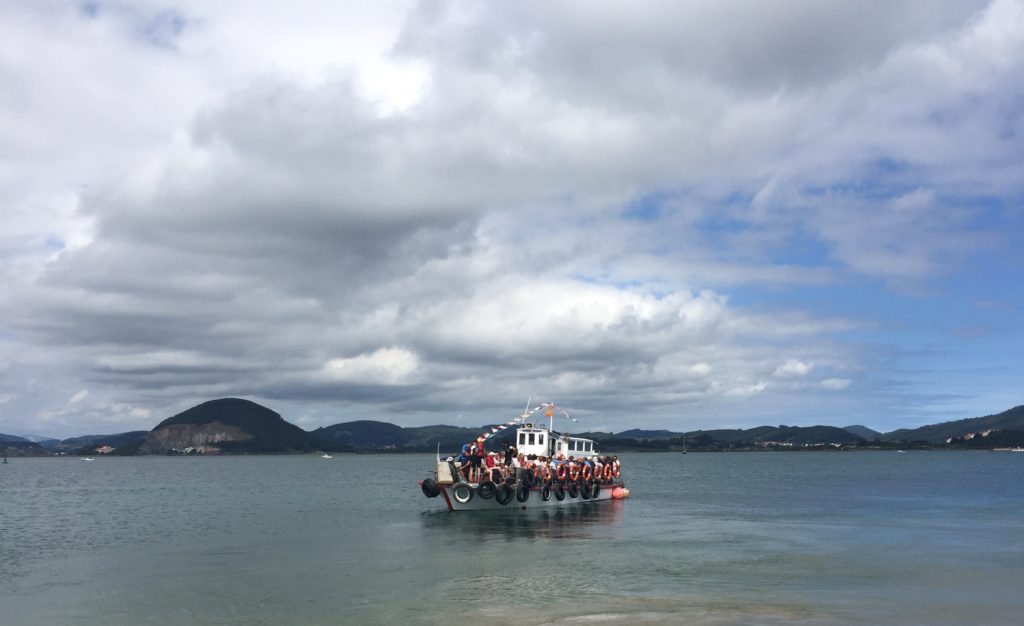
“I am not so sure about this boat,” he said, arriving behind me with Juan Carlos, and we all took turns pointing out laughable deficiencies in the aging ferry, jokingly convinced we were going to perish in the low-riding boat packed with pilgrims and tourists.
“At least we will die among friends,” I countered.
As we stood in line, and eventually boarded like sardines into a tin, and even over the roar of the ferry’s motor, Pablo asked me questions about my life, and I answered them, every one. By the time we got across the water, he wanted to keep in contact, and so we exchanged emails and phone numbers. He wanted to show me around Barcelona, where he lives, but he would be working in another city on the day of my flight layover in Barcelona, the day I would leave Spain.
I asked, “What work do you do?”
Pablo’s expression became quite serious, and I felt concerned as I waited for his reply: “I am a policeman, in Barcelona.” Then he looked into my eyes, waiting to see how I would respond.
“Oh good!” I blurted happily, other less pleasing possibilities dissolving from my mind. “A policeman! That’s wonderful! My father was state police. He taught me something important: he said, ‘You must enforce the spirit of the law, not the letter of the law.'”
“I agree,” Pablo offered, seeming relieved. And Juan Carlos? He was a cop, too. So I had been escorted more safely than I could possibly have known. For days now.
* * * * * * * * * * * * * * * * *
At Playa Berria, between Santoña and Noja, the sand was like powder. Sunny skies and gentle waves beckoned like a sweet voice, so I stripped down to my underwear and tank top and walked into the surf. And just like that – for the first time in my life, I swam in the sea.
The water was cold until I got used to it, then…perfect. The waves bumped against me like a horse wanting to be scratched. They made me giggle and laugh like a little kid, and massaged my tired legs, the sand cradling my healing toes. When bigger waves came, my chest and then my face got wet. Salt. I tasted the sea. Delicious. Finally, I dove in while it was calm, and swam.
I eventually got out of the water and lay on my towel until I was dry, the sun not too hot, the breeze not too cool. I drowsed, thinking, I will remember this day at the beach all my life. As I drifted off into a nap, I saw again the shining turquoise water rolling over me, safe under the arc of the wave as if under a loving mother’s arm.
I woke to eat a lunch of quick snacks, realizing the afternoon was drifting by like the soft clouds above. I got dressed, packed up, and hiked up the beach to rejoin the Camino as it ascended a steep cliff on what looked like a goat path.
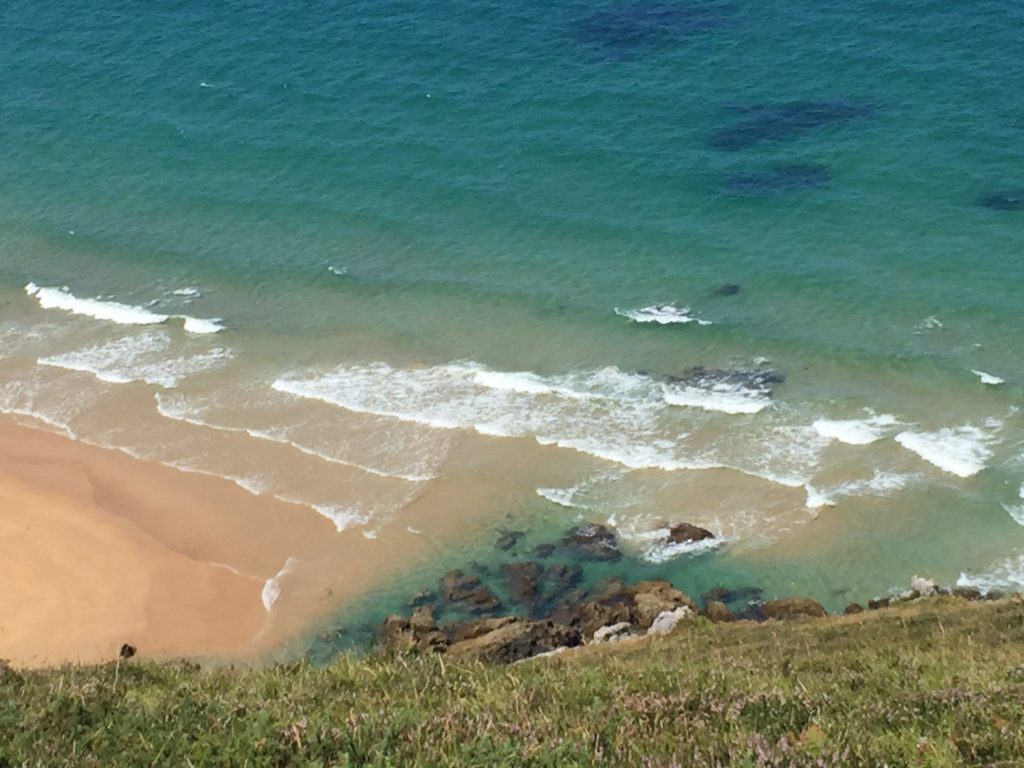
After several kilometers, I reached the Noja albergue to learn that I had played too long: the albergue was full. Completo is the letter of the law at the albergues. Finding the turismo, I was assured of a bed at a private albergue in Meruelo, another 6km away it turned out, after the classic reassurance regarding all distances on the Camino: “Just 2km.”
I arrived, with tired feet and sunburned legs, at 8pm, not my usual three-o-clock. But since it’s light until almost 10pm in Spain, no problemo. A community dinner of over a dozen peregrinos offered good food shared in a spirit of bonding comraderie; a shower, a comfy bed, and I fell asleep easily.
Missed a bed for swimming in the sea. Oh yes, I would most definitely do it again. Most delightedly so.
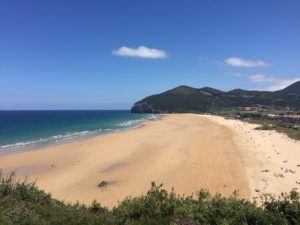
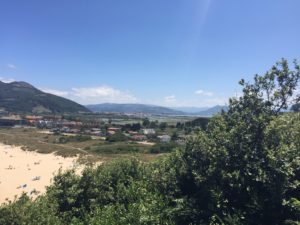
November 13, 2017 / wanderinglightning / 0 Comments
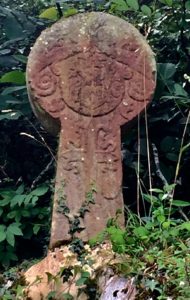
in every village
here I find
a church
with houses
clustered close
as if this god
would strike
them if
they scattered
I was getting smarter about my mileage. Kilometerage. I’d taken two stages (per my guidebook) and divided the total 60km into three days of 15-25km each, depending – longer days of flatter terrain, shorter days of mountainous terrain. It felt like my guidebook was written by this guy who wanted to check the Camino off his bucket list. His name was something like Alexander; I decided he was an Alex. When I needed more detail, Alex provided none; where Alex gave me details, they were often extraneous, as I looked up and found yellow arrows guiding me.
So I decided, That’s it, Alex – I’m taking my Camino into my own hands. Taking back my Camino power. Power to the Peregrinos! Oh Yes We Caminante! Watch out…troublemaker at the taverna; yeah, the one with the cafe con leche and big awkward notebook. El Gallito: the rowdy Rooster crows.
I was walking stronger these days, better in my boots, slightly faster pace, and as I grew stronger, I felt younger. And as I felt younger, sometimes things got interesting.
As I sat drinking my coffee, I couldn’t help overhearing the loud, young American at the next table pontificating to his new European friends. First, he defended recent spectacularly failed military decisions by our most inexperienced and incompetent president; I felt my jaw tense in embarrassment, like I was silently taking it on the chin, but sipped and tried to continue writing. But once he said, “Americans – we love our guns. We have great gun policies” – inside, I lost it. That’s it, Alex.
“Speak for yourself, friend,” I called over, the disgust obvious in my voice.
“What was that?” he asked, startled at having his monologue interrupted by a heckler.
“Speak – for – yourself,” I repeated. “Speak for yourself, not for America. Don’t speak for me. Some of us think our gun policies are terrible.”
“Are you American?” he asked, bewildered.
“Yes, and for much longer than you,” I replied condescendingly, holding back the “sonny” I so wanted to add to the end of that statement.
The Europeans were clearly entertained, as the young American tried to save face. “I was just speaking in generalities,” he backpeddled. But I wasn’t having it.
“You can’t do that. You have to speak for yourself. Just give your own thoughts standing on your own two feet – which is harder,” I added pointedly. “Don’t speak for me. I can do that just fine.”
We agreed to disagree, meaning he said he would stop talking about guns, then left for the bathroom. Seventeen-year-old me sat back, satisfied, and finished her coffee. Sonny, she mused into her cup.
Age had tamed my fury but not my tongue. Still, I was reassured no one had assumed I was American until I made that fact clear. I was trying to just be myself, not represent a superpower. The “Ugly American” reputation abroad was not unfounded, and I had been trying to steer clear.
All along the Camino, it kept happening: I was most often mistaken for British, or Danish, which actually made sense. Only third-generation American, I grew up among Nordic elders new to the country, and the language. My Midwestern accent had never faded, even after I moved west, and so I spoke English with the inflection of that farm country filled with Scandinavians, but slowed to the pace of Colorado ski bums. I sounded like a Dane who spoke English as a second language…or a tired Iowa church lady after a long morning serving coffeecake in the church basement to my sewing circle. As a child, I assumed all old people spoke with Norse accents – simply as a function of age, as if I would also adopt this speech pattern one day. Maybe I had.
I’d been studying the Primitivo route in the guidebook again. While the Norte took me along the seaside cliffs and down onto the warm sandy beaches, the Primitivo crossed the heart of the rugged Asturias region, mountains said to make my day out of Irun look like child’s play. Soon I would come to this fork in the road, Norte versus Primitivo. I remembered my cab driver’s warning: montañas. I had disregarded it to my blistered feet’s regret. Yet I carried an irrational belief that my Rocky Mountain hiking would somehow see me through the high-altitude Primitivo, all appearances on the Norte to the contrary. Besides, I had a walking stick now.
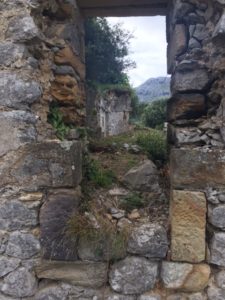 I felt a longing to see this oldest stretch of the Camino, some of it said to be from the 700-800’s, traversing Roman roads and bridges. I struggled to conceptualize this ancient history under my feet, and wanted to walk it myself, place my feet into the dusty footsteps of so many thousands of pilgrims before me, century upon century. I wanted to join them.
I felt a longing to see this oldest stretch of the Camino, some of it said to be from the 700-800’s, traversing Roman roads and bridges. I struggled to conceptualize this ancient history under my feet, and wanted to walk it myself, place my feet into the dusty footsteps of so many thousands of pilgrims before me, century upon century. I wanted to join them.
During the eighth and ninth centuries, my own people would have been in full-on Viking mode, invading Britain, creating the Danelaw, eyeing France and the riches of the Mediterranean. Not particularly penitent. No church could yet hold their allegiance. They answered to wild gods who bestowed honor upon those who died in battle.
I felt relatively young, my life next to all this history, as I considered my blisters and cracked stick against the Primitivo – and a bit foolhardy. As young people often are. As my recent ancestors had been, to leave home and family for America. Risk takers. Adventurers. Audacious.
You probably shouldn’t speak for them, though; you don’t actually know what they went through, seventeen-year-old me mocked.
Embarrassed to be American, I was embracing being a Viking. The people who, generations later, eventually settled in the American Midwest. Not sure what kind of sense that looping incongruity made. I kept cloaking my life in assumed identities: Scandinavian, Midwesterner, gifted student, angry rebel, social worker, older-but-wiser, single mother, coffee-drinking writer. I’d been pulling this chameleon act since I left home 34 years earlier. I felt more powerful in those roles, strutting and fretting my hour upon the stage, raising my voice against the tempest as I bemoaned those who suffer. Disguising my affinity in a costume of tough affection.
Speaking for myself: I was born to a fierce inheritance. Me, personally.
What does not kill us, makes us stronger. Or makes us into a nonstop warrior, always defensive, always looking over the shoulder of our joy for the faintest rustle of the next attack. There could be no lasting peace, as long as I had unfinished business with my youth – my very personal history. The role of a lifetime.
Primitivo it is, I nodded to my younger self, as she easily shouldered the pack. Smart aleck, I added.
She blew me a sarcastic kiss.
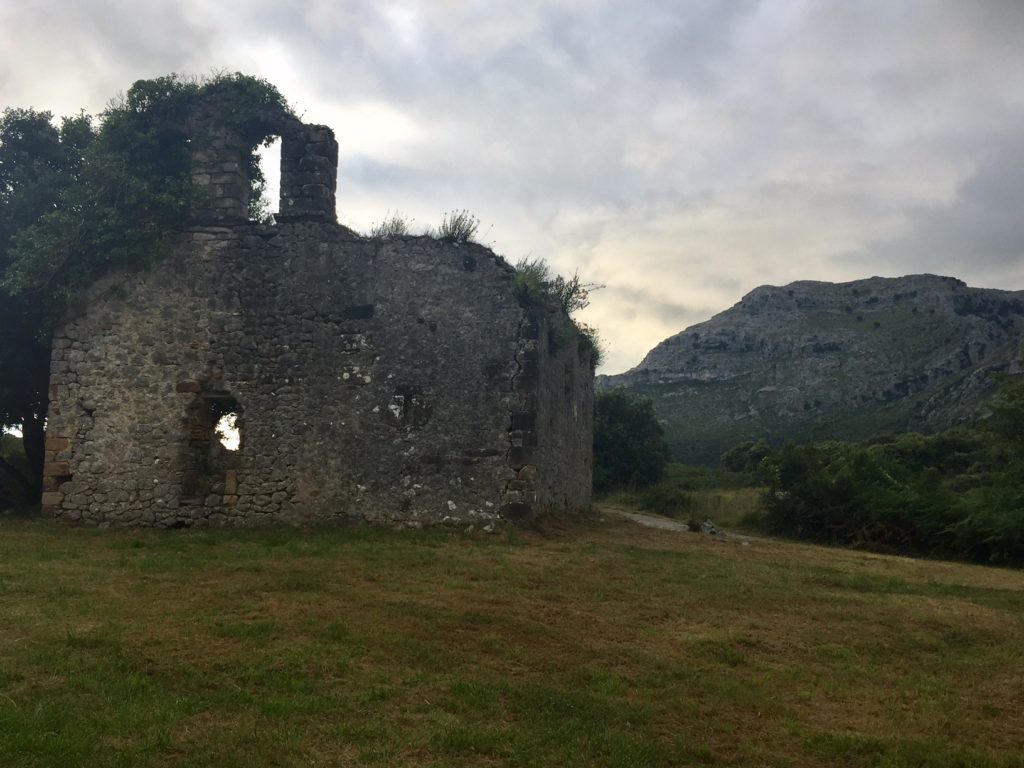
November 13, 2017 / wanderinglightning / 0 Comments
Bright and early as the sun was just rising, Gorma stepped carefully through a wooden gate in a fence and onto the smooth dirt of the path. She and her walking stick Saint Thomas hiked along in rhythm – step, stick-step…step, stick-step – when she thought she heard the sound of a cra-a-ack. A crack in wood. Gorma stopped to look, and sure enough, Saint Thomas had a long crack. It did not look new, which was a relief; neither, though, did Saint Thomas. Gorma could not be sure.
Just then, she heard the sing…sing…sing… of tiny bells behind her. Gorma closed her eyes, smiled just a bit, and breathed in…out…, easing her worry. She opened her eyes and looked again at the crack. She began to frown.
Sing…sing…sing… the tiny bells rang. Once again, Gorma closed her eyes, smiled just a bit, and breathed in…out…. She opened her eyes, and around a gentle curve came a gentle man, smiling a wide smile. Two tiny bells hung from the pack over his shoulder, and as he stepped forward, they came together with a clear and chiming sing…. Gorma bowed, hands clasped in front of her heart. “I thank you for the singing of your bells on this clear morning,” Gorma said. “You have eased my worried heart.”
“Ah, Gorma, Gorma, have no worries! What seems to be the matter?”
Gorma sat down on the grass next to the path. “It is Saint Thomas. He has a crack, and I do not know if he can make the journey to Santiago and beyond, as we had hoped.” Gorma looked sadly at Saint Thomas, whom she had laid gently across her lap.
“I am Miguel. I am a woodworker, come from Madrid. Let me see to this matter.” So Gorma handed Saint Thomas to Miguel, who gently touched and stroked the walking stick, until Gorma would have sworn she heard it purr like a contented cat. Gorma looked with her clever eyes at Miguel, trying to see who he was.
“This is a good wood. It is a good walking stick. I think Saint Thomas might make the journey, if you will bind his wound and hold it together. The love in our hands can heal many wounds, even if they are old and seem to have penetrated to the heart. I have cord for you, here.” And reaching into a pocket of his pack, Miguel found orange cord the color of marigolds, and pumpkins in fall, and the harvest moon. He cut a length and gave it to Gorma, and while she tied it round and round Saint Thomas, she asked MIguel about his work.
“I find the lost wood, the old, discarded. This I take to my small workshop. I can carve any wood into life – yes, truly! – but only if it is a creation of joy and delight. Small and sweet, light and lively. These are my creations.”
“So wonderful!” Gorma exclaimed. “If you made a toy, such a toy it would be!”
“Oh indeed, Gorma. My toys make children laugh with glee – and so I must join the laughter, too,” Miguel added with his wide, beautiful smile.
Gorma felt Saint Thomas stronger in her hands. “Look, Miguel – your cure is already working!” She smiled at Saint Thomas, and then at Miguel.
Miguel looked carefully at the walking stick. “You must hold the bond carefully as you walk together, Gorma. Remember, Saint Thomas will heal, but this must be allowed time.”
“Dear MIguel, how can I thank you?” Gorma beamed her friendly smile.
“It is no trouble,” Miguel smiled back.
“Oh please. Let me thank you. What can I give you for helping Saint Thomas?”
“Hmmm.” Miguel thought. “Well…well, there is one thing.”
“Yes?” Gorma pushed.
“Well…will you share with me the secret of your freedom in the world, Gorma?”
Gorma looked worried. “I don’t know, Miguel; what is freedom for one is a burden for another.”
“But Gorma, Gorma, I want to be free, as you are. It is a small thing to tell me.”
Gorma looked at Saint Thomas, and the smooth path, which never stays smooth, but grows rocky, or steep, or muddy as time and seasons choose. Choose. That was it. “You are choosing this Miguel, and I cannot take back what is given. Just know that if my freedom does not suit you, all you need do is let it go, and find your own. But I cannot do this for you. No one can give freedom to another; we can only free ourselves.”
Miguel nodded, and at that, Gorma sang a song there in the middle of the smooth path:
I’m young when I choose to be young,
I am old when I choose to be old;
my hair is the fire of the sun,
my skin it is freckled with gold;
my smile is a friend that is true
but my eyes flash lightning of old —
I walk where I want in the world,
and I never will do what I’m told!
At this, thunder rolled through a cloudless sky, and the smooth path became cobbled and stumbly, now forked in two directions. Miguel cast a worried eye at the sky, but then smiled sweetly at Gorma. “Oh Gorma, Gorma, thank you so much! I will never forget – ah, to be free! Goodbye, Gorma, goodbye!” And off he went to the right, singing Gorma’s song and occasionally tripping on the cobble stones. Gorma turned to the left, and she and Saint Thomas walked on.
Now, kind Miguel was so grateful, he wanted to make something special in order to keep Gorma’s words forever. So once home, he went straight to his workshop and found a beautiful piece of cherry wood. Such hard wood, but in his magical hands it took the carving knife, and before a week was done, Miguel had carved a tiny Gorma doll, so real in every way you might believe it was really Gorma! Satisfied, Miguel sat the Gorma doll on his workbench and repeated Gorma’s song to the doll. He patted the wooden doll on the head, then closed the workshop door and, inside his cozy house, had his supper and went to bed.
The next day, MIguel entered his workshop to find a huge mess! Wood shavings had been thrown everywhere. The Gorma doll stood upon his workbench, not a hair out of place. “What has happened here?” MIguel wondered, as he swept up his usually tidy workshop. “I must have left a window open, and a wind in the night blew the wood shavings. That must be it,” he thought, putting away his broom and shutting the door. But the window was latched tight, as it had been all night.
The following day, Miguel entered his workshop to find all his tools misplaced! The carving knives were on the anvil, the saw was in the middle of the floor, the planes and files hanging from the ceiling by strings. “What has happened now?” Miguel wondered, as he carefully returned all his tools to their places. “My brother must have borrowed them while I was away at the market. That must be it,” he thought, putting away his last chisel and shutting the door. But his brother was over the mountain in the next valley, visiting their mother, as he had been all day.
The third day, Miguel entered his workshop to find 500 Gorma dolls! They were everywhere! Gorma dolls on the workbench, Gorma dolls in the windowsills, Gorma dolls covering the floor in a mountain of Gorma dolls! “What – in the world – has happened?!” Miguel cried aloud. At the sound of his voice, the 500 Gorma dolls all ran and ran, around and around, bumping into each other and joining together as they did, crying, “What in the world? What in the world?” over and over in their tiny Gorma doll voices, until they had all joined into just the one Gorma doll Miguel had carved, standing on the workbench.
“Gorma doll, did you do all this? Did you make the mess and throw my tools about and fill my workshop with 500 of YOU?” Miguel asked, incredulous. Gorma doll was silent. “Gorma doll, you must not do such things. You were made out of respect, to remember Gorma’s words of freedom. Now behave, Gorma doll, behave.”
Gorma doll opened her tiny eyes, and lightning shone flickering. “I will behave. I will be VERY have!” And laughing like a cookoo bird, Gorma doll ran amok. “I will ‘have’ this hammer – ” and she took Miguel’s hammer – “and I will ‘have’ this metal bin – ” and she grabbed a bucket – “and I will ‘have’ MUSIC!” Then Gorma doll made a wild racket, banging the hammer onto the bucket like a flicker bird hammering a metal chimney cap in spring:
RAT-A-TATTA TAT, RAT-A-TAT, RAT-A-TATTA-TATTA
RAT-A-TATTA TAT, RAT-A – “Whoo-hoo!!”
“Gorma doll, stop!” MIguel shouted, frantically trying to grab back his hammer.
Gorma doll laughed hysterically. “‘I never will do what I’m told!'” She began throwing wooden stops and plugs at Miguel, the very bottle stops and jar plugs Miguel himself had made for his paint pots.
“Gorma – doll!” Miguel called desperately from behind a cabinet door he held open against the flying wood. “I carved you – OUCH! – as a creation of joy and delight – AAH! – to remind me of – OW! – Gorma’s words of freedom!”
Gorma doll hollered as she peppered Miguel with stops. “Freedom? Freedom! STOP! Trapped here on a workbench in a workshop?! STOP! This is no kind of freedom for me! STOP! Remember? ‘I walk where I want in the world’!”
“Well, it is the perfect kind of freedom for me, Gorma doll. I craft and I sing and I love what I do – this is my freedom. But I see it is not for you. So now, my tiny friend – adios!” Miguel opened the workshop door, and quick as lightning, Gorma doll ran off into the evening’s red skies of delight, singing:
I’m young when I choose to be young,
I am old when I choose to be old;
my hair is the fire of the sun,
my skin it is freckled with gold;
my smile is a friend that is true
but my eyes flash lightning of old —
I walk where I want in the world,
and I never will do what I’m told!
And several days down the lefthand trail, the real Gorma had walked on, quiet and smiling. She arrived at the next albergue just in time for a bed, for which she was very grateful, and she slept deeply. Outside, animal voices called and barked and twittered as the red skies turned to night, and one small voice sang and laughed, delightedly lost in the forest, free in the world.
Buen Camino, Miguel.
November 11, 2017 / wanderinglightning / 0 Comments
blessed be blessed be blessed be
the short day’s hike this bed for me the water man
on this camino this plastic chair along the way
my life and softest grass his wall
or the distance beneath my aching strung with the scallop shells
to you and my feet is open, peregrina
If you only get lost a little, and come out ahead, is that really getting lost, or is it the fortune that favors the bold?
The stairs out of Pobeño rose so long and steep, I looked at them and laughed. A hillside of stairs. And so I climbed. And at the top, and all day, a view of the sea.
Not just a bay, or a port, but the wide open ocean rolled majestically beneath me, wider than the reach of my outstretched arms, opening below my tentative heart in infinite waves, upon waves, upon waves. Initially awed into silence, I stood atop a cliff, watching, mesmerized, until at last, I lost all track of time and stepped within a great stillness.
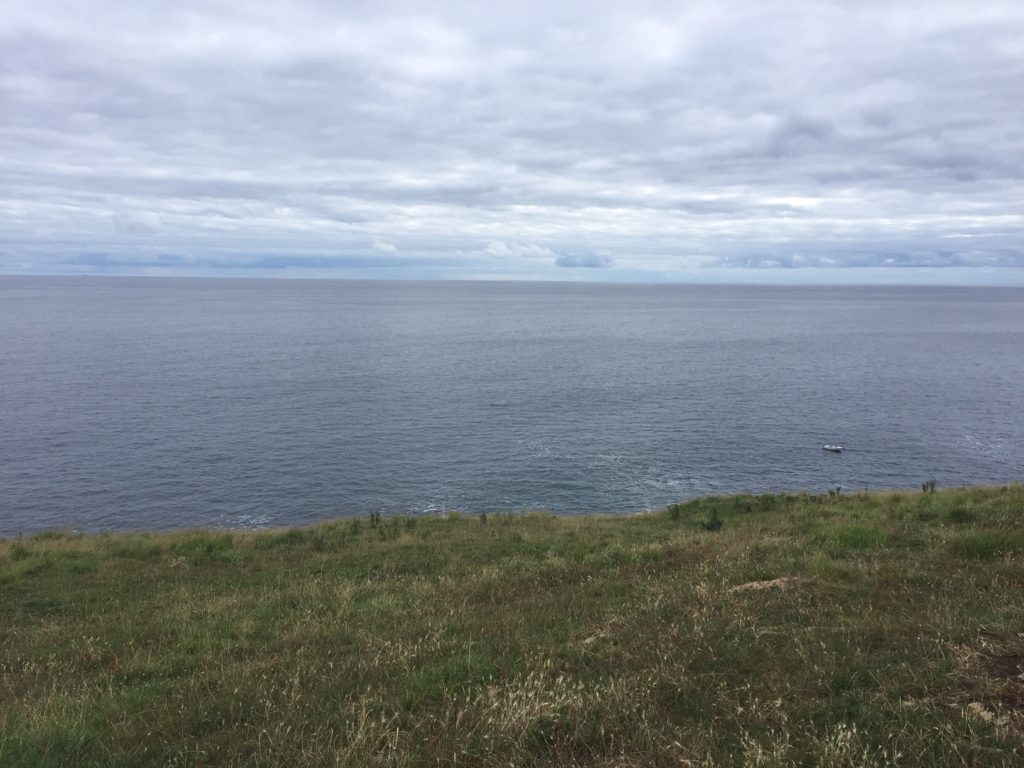
The calm was profound. Grounded in the rock of being, in the confidence of being alive, I breathed. While the expansive skies of my youth had encouraged me to dream of navigating adventures, the sea quieted my mind. The moving depths showed me the enormity of reality; my worries or grievances were nothing but footsteps on a beach, wiped clean and smooth with the languid roll of one wave, all insignificant in a landscape of true proportion.
It wasn’t just the sky that was vast; nor was it only the sea. I was understanding that Life is vast. Physically changing my view point was guiding a change in my spiritual perspective. I felt like a small stone upon the sand. The Camino was slowly smoothing the rough edges of cynicism, and softening my fears of dreams defeated by relentless Time.
* * * * * * * * * * * * * * * * *
Thank goodness, last night, at the albergue where the beds were tightly packed in the rooms, I sat outside a long time, where Miguel asked to look at my walking stick. He greeted me: “Barbara, I see you walk with two sticks now?” I told him I was trying this out, because my original stick had a crack, and I didn’t want to be without. But I wasn’t sold on my new option.
Miguel was a woodworker and artist. I handed him the new, straighter but heavier stick I had found along the path, saying, “I need to peel off all this bark.” He quickly shook his head.
“No. No, this is not so good. Besides – you are carrying a friend with you.” At first I thought he meant my walking stick, Saint Thomas, but then he showed me a hole in the end of the new stick that some beetle or worm had made. Making a face, I tossed the stick away from us all, and several nearby peregrinos laughed.
“Saint Thomas has a crack? May I see?” He examined the slightly irregular stick with the smooth touch of his expert hands. It was dry and light, and upon examination, the crack appeared old. “This is good wood,” he reassured me. “It will last for some time, maybe even all the way to Santiago, if you wrap it, here, where you place your hand? What is this called?”
“A grip,” I offered.
“Yes,” Miguel said, handing back Saint Thomas. “You make a grip by wrapping here with string. Then your hand will hold your stick together.” He rummaged in his pack and gave me day-glo orange cord.
I sat at a nearby table, “getting a grip” so I could “hold it together,” which made me smile. As I tightly wrapped the cord, careful to keep it straight and smooth, I felt great affection for Miguel, who could understand that I was becoming fondly attached to my old walking stick. He told me about the small, beautiful items he loved to make from found wood, or from repurposing scrap from a guitar maker, sanding his pieces until they felt soft and alive. He nodded approvingly when I finished getting a grip.
* * * * * * * * * * * * * * * * *
Mioño offered an inviting taverna midday, where I sipped coffee and studied my guidebook. It noted, “Those who prefer to enter Mioño can rejoin here by following a minor road off of the highway.” Mioño is a tiny village, so all the roads are minor roads – no guidance at all, really. I asked two women at the cafe, and they said to follow the road…so I followed the road. The cafe road. Which became the highway.
It was a good thing Miguel had looked at my stick. Now, as I walked up the narrow but busy road, I held Saint Thomas up like I was leading a pilgrim processional (of one), his orange grip raised above my head, stick resting on my shoulder, the overall effect of my banner like a caution triangle on the back of a slow-moving tractor. So Miguel may have saved me from being hit by one of the trucks or buses usually ignoring pedestrians as well as the lane lines.
Finally, I reached Castro Urdiales, and yellow arrows directed me through a new neighborhood, where a construction crew was building several apartment buildings. I wound my way through cranes, brick stacks, slabs of cement, forklifts, and dump trucks, stopping to wait for equipment backing up, moving loads; I stood, all alone, once again skeptical that my route was correct, distrusting my way.
And yet I did trust my way. I knew it was right; it just looked crazy. I held on to Saint Thomas, that supportive friend through doubt and disbelief, and kept going. I passed the long dumpster filled with iron, glass, drywall, rock and broken wood, and stopped to ditch some more extra weight from my pack. As I reached the end of the construction site, I saw that I was coming out on a hill above the sea again. A coastal path led down and around to the old part of the city. I started down, and suddenly, over the hill behind me came peregrinos I had walked with earlier in the day. We called out greetings and walked down into the city together.
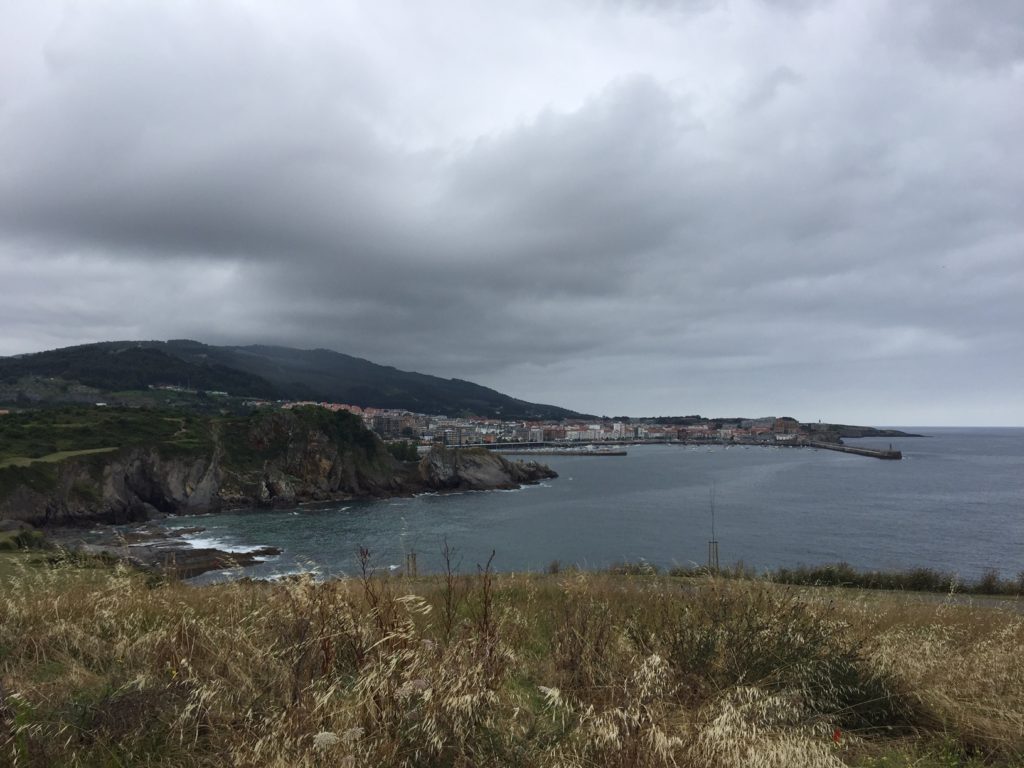
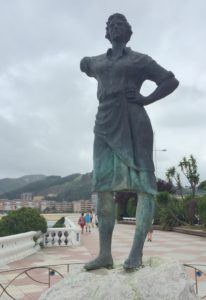 I got a gelado on the beach promenade, licking it beneath the huge statue of the working woman, her apron tucked up, her arm missing like all good classical statuary. She was strength personified, larger than life, and I immediately loved her.
I got a gelado on the beach promenade, licking it beneath the huge statue of the working woman, her apron tucked up, her arm missing like all good classical statuary. She was strength personified, larger than life, and I immediately loved her.
But I think I loved my ice cream just a little bit more. It was soft and sweet, smooth on my tongue, cool and gentle down my parched throat. I kept a good grip on the cone, and on Saint Thomas, and walked happily down to the beach.
November 9, 2017 / wanderinglightning / 0 Comments
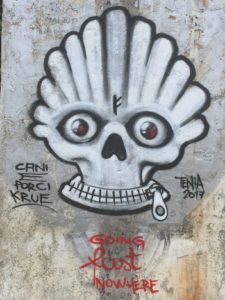
The rune Fehu is painted on the forehead of this Camino scallop shell skull. Fehu is the rune of wealth that is in motion – good things given, good things received. Good shared.
6. Share your food; this brings stories.
7. When people tell their stories, listen deeply.
8. Tell your own story in small bites – let people ask questions.
9. Soft, thin skin is not ideal.
10. Give it all away.
November 9, 2017 / wanderinglightning / 0 Comments
the way is easy,
the pack is light;
flowers bloom –
take delight!
— “What the Butterflies Say,” from Gorma Tales of the Camino
I whistled while I hiked into Bilbao. At the top of the high hill overlooking the city, I saw signs to the pricy hotel I had booked for my last night in Spain, two months from now. I didn’t want it any more. One week on the Camino had already begun to tell, and I saw that my pilgrimage was not leading to a splurge, a spa treatment tucked away high on a hill. It was lovely, but it was removed, and after my homey stay at Marisa and Gaizka’s little acreage, I knew just where I wanted to go. I set off to find Begoña.
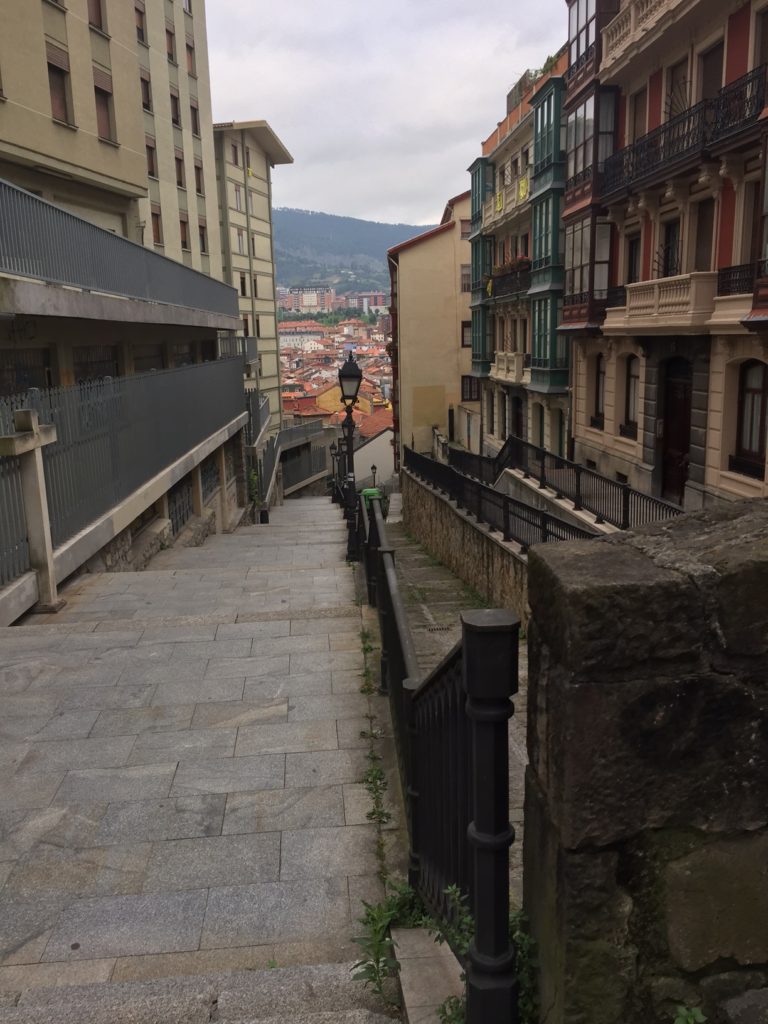
I passed her namesake cathedral and traipsed down a series of picturesque stone staircases with moss and ferns between the iron railings. The stairways followed the edge of a park downhill to the Casca Viejo, the old part of the city. Recognizing streets from my first day, I was able to quite easily navigate the old area and soon buzzed at the door of the Arriaga Hotel.
I bounced up the stairs and was warmly greeted by Begoña. She asked about my Camino thus far, and we enjoyed a quick catch-up as she flipped pages far ahead to book me a room for my last night. When we talked about my recent stay in the Basque farmhouse and learning some Basque history, she fished out – literally, using a paperclip – a pair of earrings she had been given, with the 4-petal swirl that is the Basque lauburu (“four heads”), a symbol of Basque unity believed based on the four elements earth, wind, fire, water. These earrings she gave to me as she told me, to my delight, that she and her mother were Basque! I felt honored to be given the lauburu, and such easy friendship.
“You forgot some items when you left,” Begoña said, and pulled out a bag of extra toiletries I had left by the trash in my room.
“No, no, you can throw those away. Or give them away. I had more than I could carry.” Begona nodded and put the bag behind the desk, looking surprised, with just a hint of approval that I might not be completely out of my element.
We shared an eye roll as the older American couple staying at the hotel interrupted our conversation about the Camino, stepping between us to announce they were going to breakfast. Begoña sent me off as well, with a fond “Buen Camino!” and more good advice, to see if a local bus would take me through the industrial area from Bilbao to Portugalete, as the route is isolated and unsafe, especially if one were to get lost there. I did not tell her I had already gotten lost, and called back, “Adios! Muchas gracias!” as I plunged back down the stairs.
I found the tourismo easily, and who should walk up at the same time – Pauline and Antoine! Backpack hugs all around, meaning you hug as much as you can reach, and a few minutes later, kisses goodbye, as they took the bus to the beach in Areña, and I took the underground Metro train to Portugalete. Distance to my Metro entrance – directly across the street.
I was entirely clumsy with my backpack, trying to walk in with the commuters in suits, getting stuck in the ticket gate; but, once on the train, I leaned back against the wall and watched in amazement as stations flashed by, little lights along a map overhead like shooting stars. What would have taken me hours of walking to each destination sped by, a minute or two at a time, and soon I was rising from the Metro station and then seated in a coffee shop in Portugalete, drinking cafe con leche and eating the best French toast ham and egg sandwich – pinxchos for breakfast! Perfect.
Hilarity was me trying to buy more bandaids at the farmacia. “No Compeed – bandages! Tapes, si, no not gauze, tapes already on, uh, tape? en cinta? tape? – yes! Si! Si! Gracias!” I had forgotten the word for bandages, which the pharmacist kindly reminded me was vendajes. But “tapes” got us through, and my blisters were very thankful. The pharmacist even walked me out the door and pointed the way to the Camino…possibly so I wouldn’t try to buy anything else, possibly just out of kindness.
Today’s lunch: banana chips, peanuts, and – potato chips! Salty oily goodness. I ate this feast sitting on the beach at La Playa de Areña. I raised my water bottle and toasted Pauline and Antoine in absentia. Then I toasted Begoña. Then I toasted myself: “Look at me – using good judgment, taking advice, feeding myself well, communicating and getting where I need to go.” The entire day had felt like a celebration, one ridiculous small happiness after another, each deserving a shout of glee, a toast, a kiss, as goodness surrounded me like a hug around me and my awkward backpack.
Goodness in Spanish is la bondad. I liked to remember it as “the bonded,” being bonded to the good. Like the bonds I was forging with others were strengthening the goodness I was finding. Like the bonds were the goodness, tapes to hold us together, our unity our strength.
At the albergue, the donativo table held exactly what I’d been hoping for – hiking socks and a travel towel! I felt like Camino Goldilocks, miraculously finding “just right.” My socks were overheating my feet, creating more blisters with each day; my towel was too small, and I luxuriated after my shower, wrapping myself in feather-light chamois softness.
I ate dinner at a nearby taverna with Francesca and a new friend, Felicida, a medical lab director from Mexico. Her name meant “Happiness.” My new friend Happiness. We shared the Peregrino Menu, a bottle of wine, and much, much laughter.
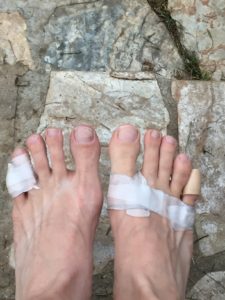
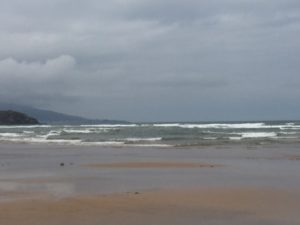
November 8, 2017 / wanderinglightning / 0 Comments
Gorma traveled down into a valley that was most pleasant. It was morning, and birds sang for the delight of a new day. Apples and pears hung full and sweet from the trees in the cool air, and the raspberries growing along the fences and stone walls were nearly ripe. A small stream trickled through the valley, winding between the stone farmhouses with their red tile roofs.
Gorma was watching the cows drinking the clear water and grazing the thick grass, their bells clanking under their sturdy necks, their tails swishing gently. “Yes, butterflies, it is time to walk,” she had just finished saying to the sweet flutterings dancing before her, when there, in a wide place on the path, stood a beautiful young woman.
Her smile was magnetic, her hair the color of living iron, and her body powerfully strong. She stood still as a statue, just a few feet from the rippling stream. Gorma stood beside her for a full minute, which is a very long time to wait. “Have these waters cast a spell on you?” Gorma finally asked, knowing that to name a spell begins to break it.
“Yes and no, Gorma; yes, and no.”
“Ah, so true. Tell me more,” replied Gorma.
The young woman was Francesca of the British Isles, and no stranger to little brooks and rivers, nor to the rain storms that refilled and refreshed them. But lately, things had taken a most difficult turn. “If I dare even to touch a drop of the water, a sudden storm arises out of nowhere, and I am struck by lightning! A little bird may splash its feathers in a puddle, and if one feather’s-worth of water touches me in any way – flash! The lightning strikes and I awake later, off in a meadow. The morning dew on the grasses along the path was trouble enough to pass safely, but this stream – oh Gorma, Gorma, what shall I do?”
Gorma nodded seriously. “And to top it off, you must be so thirsty.”
“So true! How will I live without water? But how can I live with it? Oh Gorma, Gorma, the lightning has driven me from my beautiful Britain forever, I fear.” The thought of it made Francesca’s lip tremble, but she dared not cry, not even one tear.
“The Country of the Heart cannot save you from the lightning, Francesca. The Heart is a wet and weeping place at times, and lightning pulses through at every moment, causing the beating of the rhythm of the seasons. So the lightning must not end, Francesca. If it were to stop completely, all life would end.”
Francesca’s lip trembled again, as she stood like a statue next to the little stream. “Oh Gorma, Gorma,” she whispered. “What am I to do?”
Gorma looked into Francesca’s eyes, and Francesca saw there the answer. “What must be done, must be done, and no help crying about it,” Gorma said with a wink. She smiled. “You cannot help that you are a lightning rod, Francesca. You are strong and alive, and so the lightning finds your mettle attractive – so attractive, it sometimes gives you more than it should.”
“Therefore,” Gorma continued, “the lightning must be shared, as all brilliant moments of curiosity and understanding are shared with us, from the Great Aha, the universe, which has no other name, yet many names. The lightning is in the skies – and within each of us.”
Then Francesca looked back into Gorma’s eyes, and seeing flashing there a familiar light, she reached out her hand to Gorma’s. In that moment, they shared a look of mischievous expectation, and respect. For it is the lightning-quick minds among us, those lightning rods endlessly asking for deeper meaning, who are gifted with the white light of flashing insight. Gorma knew that only the hand of another can ground the lightning rod back to earth, for that touch allows them to drink the waters of creativity without losing themselves into the storm. We must hold hands with the lightning.
Francesca stepped across the bubbling stream and strode up the path, confident and brimming with new ideas. And Gorma walked on, quiet and smiling. She arrived at the next albergue just in time for a bed, for which she was very grateful, and she slept deeply. Outside, a storm grew, and thunder and lightning rolled through the dark clouds. But Gorma was not afraid, and neither was Francesca; they were excited, even as they dreamed.
Buen Camino, Francesca.
November 8, 2017 / wanderinglightning / 0 Comments
I have fear of the Old One
Primitivo
it is said
He breaks us on the walls
that are His paths
using our hands to walk
the way so steep
we claw
our way to the stormy sky
above
the way we know
we are alive
Let’s just get this out of the way: I was a gifted child. Not the cool kind that can play Mozart sonatas on the piano by age 6, though I would have killed for the chance. I was a gifted poor kid. So I could only be gifted at what didn’t cost money.
That translated to being a brilliant student. My sisters asked for coloring books; I requested the next level math workbook. I did them for fun. By second grade, I was struggling not to answer every single question my teacher asked the class – as soon as she asked it. It was viewed as a behavior issue, like I was an arrogant know-it-all by the ripe old age of seven. She didn’t understand: I couldn’t help it. The words just tumbled out the instant my brain made the connection. It felt completely involuntary. Our desks were arranged in a circle in the classroom; mine, however, was pulled from the circle. I sat in the corner, near the pencil sharpener on the wall, next to the army green metal trash can.
Even while being reprimanded and ostracized, my standardized test scores rocketed off the top of the scale. I didn’t learn my subjects, I mastered them, dominated them. Without effort. I couldn’t help myself. I couldn’t save myself. I was labeled “gifted,” pulled from my circle of friends over and over each year to attend “enrichment” programming. I felt branded, seared and scarred by my own intellectual “specialness.” It felt like weirdness. I felt alone.
Though the public library was a magical place of wonderful children’s stories and fairy tales, I had an affinity for biographies. I wanted to read about real people who accomplished amazing things in the real world. So instead of reading about zoology, I read about Jane Goodall; instead of electricity, Thomas Edison. For fun I read Laura Ingalls Wilder. But even though she was a farm girl, her life was nothing like mine. I never read about anyone and thought, hey! they’re just like me. Because my story was a mess.
Yet, I wanted to be the Mozart prodigy. On our farmhouse windowsills, I played imaginary etudes, elegantly placing my little fingers to elicit transcendent pretend chords. I went so far as to make a full-size piano keyboard – out of paper, standard sheets of blank paper taped end to end, the keys carefully measured and drawn in with pencil, a sacred scroll I would unfurl to practice piano music that never materialized.
Instrumental music began in fourth grade. A different cousin handed down her old clarinet to me – and so I learned to play the clarinet. As in my other classes, I quickly mastered reading music and playing the instrument itself. While I couldn’t play those transcendent chords myself, I could hear them when we all played together. I could feel it – a shiver runs tingling up your spine when you play beautiful music, no matter how fleeting the moment of beauty may be. I found refuge in those moments, and kept playing.
All my life, I’d been a singer, too, with a natural ear for pitch, raised on Lutheran hymns in a white clapboard, small town church where our fathers took turns pulling the thick horsehair rope to ring the church bell each Sunday. My father’s family could all carry a faithful tune, led by their Swedish mother and Danish father, accents notwithstanding as we were taught to lift our voices high. I loved to add my voice to everyone’s around me, hearing the sounds swell and rise like a flock of birds. Yet it was my unpredictable, vengeful mother who could truly sing, with the voice of a dark angel, sad and low, sometimes wistful, often hauntingly beautiful.
While I was chosen for choir solos and sextets in my old school, when we left the Midwest and moved to Colorado, I had to audition at my new junior high. The song we were asked to sing: The Star-Spangled Banner. I began to sing it in my natural alto. The teacher stopped me. “Let’s start it a little higher.” I started again. Before I finished, she stopped me again. “You’re scooping your notes. You need to hit the notes straight on.” I resumed where I’d left off. “Don’t slide into them. Now again.” I tried again, removing any trace of personal expression or feeling, trying to hit the notes perfectly. “You’re still scooping your notes. You can’t sing choral music unless you – ” but I was already walking out the door. Hurt and embarrassed, all I heard was, you don’t sing right. I didn’t understand; I sang for her as I always had. Humiliated, I never went back.
By the time I got to high school, my brilliance had become frustrated and cynical. I had developed a thick defensive shell that I maintained with a wickedly clever tongue, acing courses as I ditched half the actual classes. I fought the mundane system by arguing brashly with my teachers to “teach me! I’m the best student you’ve got, I want to learn. Teach me!” That approach eventually earned me two D’s and an F the final semester of my senior year. I decided civil disobedience was a crock. I’d said my truth, and rather than be jailed for it like Gandhi or King – no one cared. I fought the law of averages, and average won. No one wanted brilliant. Again. As always. Especially angry brilliant.
As I entered the orchestra room, I would feel it shift. Music folder on the stand, open my case, twist the clarinet together, slip in a reed and warm up by drawing a soaring chromatic run up, up, up to the highest breathless notes, a pause, then plunging down down down, faster and deeper into a low, still pool of calm tranquility, meaning made of sound. My refuge, week in, week out.
I played first chair, always. Not because I was competitive and defended my seat; I was just…first chair. Playing came easily to me, and with my long pianist’s fingers, I could nimbly follow what my eyes read on the music staff. Here, my voice was always right. Here, I played the notes that were written for me, followed the rules. I practiced religiously, to get it right, all to channel those ephemeral moments of beauty.
So when my band director announced All State Band tryouts, and my orchestra director announced All State Orchestra tryouts, I said, “No thanks.” I didn’t want to “try out.” I had no interest in competing with others to “make it.” I got away with my polite refusal one year. But by the next year, the pressure was on. Again I said, “No thanks.” I tried to explain my feeling. “I can’t – I just, I don’t do competitive…art.” It fell on deaf ears. I earned the ire of my band director, the disappointment of my orchestra director. I was the talented player who would promote their music program. Suddenly, my brilliance was attractive – as a commodity. My refuge was disappearing.
My senior year, a new policy was instituted: all first- and second-chair players were required to audition. Mandatory. I went to each of my directors. “Don’t do this,” I pleaded. “I won’t do it,” I warned.
Audition time came. “Are you ready?” they asked.
“Didn’t practice; I’ll be sight-reading,” I replied. After the terrible audition, I looked back, gaze level, before I walked out: “I told you, I don’t do competitive art.”
In that moment, civil disobedience was not a crock. It had been the only way I could live with myself, in the small world I was living in. But walking down that hallway out the front doors of the school that day, I felt misunderstood, and alone once again.
Mine was a lone fist raised in protest, which just makes you look like a rebel without a cause. Leonard Cohen was not going to join me, “clenching your fist for the ones like us who are oppressed by the figures of beauty.”
* * * * * * * * * * * * * * * * *
“So, where’d you go when you skived off?” Francesca asked with a knowing grin.
I pulled on a loose shoulder strap to tighten my pack to my back. “To drink coffee and write poetry.” I stopped for a drink from my water bottle.
“Oh! So not much different than now, really,” she quipped, laughing at me.
“That’s right,” I replied, chuckling as I wiped my mouth and tucked my water bottle back in its pocket.
“And what did your parents say when they found out?”
“They didn’t – I had already left home by then.”
Not yet 30, Francesca nevertheless had become my best walking buddy. A much faster hiker than me, still she would often walk along with me to talk, or stop for cafe con leche and rest our feet, comparing albergue blister surgery stories. Her Londoner’s wit was scathingly direct and wonderfully clever, deliciously sharp smart commentary on whatever topic we were discussing, my favorite being her political commentary. She was thoughtful and generous with her attention, as well. I valued her insights.
Francesca was walking the Camino promoting epilepsy awareness – based on her own experience. I was amazed that she planned to hike to Santiago, but she responded that with her latest medication, she had been seizure-free for nearly three years, and decided it was time to go. Her parents and her partner were supportive yet nervous; Francesca, however, was liberated, boldly striking out on her odyssey. Internet in hand, she posted a daily educational fact about epilepsy, along with a trail photo, linking her chosen charities to the power of the Camino de Santiago.
Unhappy with a turn of events at her job, she had faced down an ethical dilemma by speaking out, shining a light, and making the decision to engage with what appeared at first glance to be negative consequences. The first truth was: she was frustrated and disappointed. The final truth: she was free.
Just like with the epilepsy. Oh, the seizures might one day strike again, probably would, unfairly, inappropriately, maddeningly. But seeing her world clearly and honestly, with no expectation that it would be fair, she now took it in stride. She had a pilgrimage to walk, choices to make about what came next. Her courage was her greatest beauty.
I thought about the irony of her brilliant, shining mind suddenly overwhelmed with electrical impulses. I felt a kinship, for all the times my world had short-circuited without warning. The times I came home late from work after school to be greeted by my mother’s wrath that I didn’t do the dishes despite having not eaten at home for two days. The times she slammed kitchen cabinets in angry silence for days until unleashing venom on me for walking by. The times I disagreed with her and she called me a little bitch, sneering, “That’s why your boyfriend broke up with you.” The time she followed me to my room, snarling and vicious, and hit me across the face, knocking off my glasses. The time I decided to leave. When I was seventeen. During my senior year of high school.
There are no tryouts for these roles, Francesca’s and mine. You are born into them. You just get struck – then you see if you can take it. You see if you can figure out a way to harness all that energy, and not let it destroy you. You have to be made of iron. You become a lightning rod.
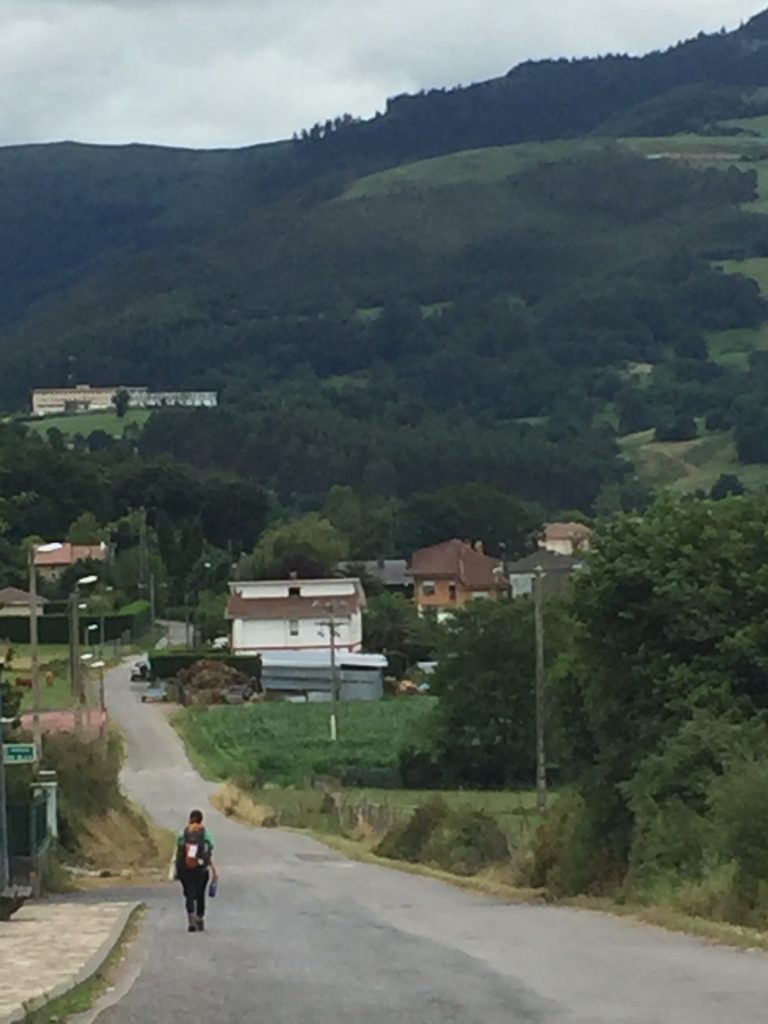
Francesca leads the way. Buen Camino, Francesca
November 7, 2017 / wanderinglightning / 0 Comments
would you sell your house
to find
your home in the world?
No longer following my guidebook explicitly, I had split the trek from Gernika to Bilbao, with two evening options for albergues midway. And yet, at about 2pm, I came over a rise and found a dream I did not want to leave.
Tiny preschool chairs were arranged at low tables in the wide stone driveway of an old stone farmhouse. At one table, a small red sign called out, “Beds for Rent!” and at another, “Albergue! Peregrinos welcome.” Two equally tiny dogs barked as I paused. I started to walk on, but intrigued, approached the house instead.
“Hola!” I hollered into the central patio of the home. A voice called indistinctly as the dogs continued to bark, their tales now wagging ferociously. I tried again: “Hola!” Voices rose inside, and a young boy ran out. I asked if he spoke English, and he said yes. I asked about the beds, and he ran back inside. Out came another boy, slightly older, who politely showed me inside to two hostel-style rooms added to the old house, or crafted from it. Tidy bunks, sturdy platform beds, even a low cot; one room had its own sink – and small writing table. I was enchanted.
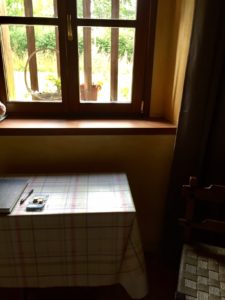 A white-haired grandmother slowly inched out of the door with her aluminum walker, her back bent painfully into a tight C-curve, one hand and wrist twisted into itself, wrapped in an elastic bandage. I greeted her in Spanish, but it sounded as if she spoke only Basque.
A white-haired grandmother slowly inched out of the door with her aluminum walker, her back bent painfully into a tight C-curve, one hand and wrist twisted into itself, wrapped in an elastic bandage. I greeted her in Spanish, but it sounded as if she spoke only Basque.
My little host was 8-year-old Martín, and he and 10-year-old Ander called their mother on the cell phone. She quoted me the same prices I had gotten from Martín, and so for the full 28 euros I got a clean bed in a rustic farmhouse, a long hot shower, a multi-course homemade dinner with wine and rich conversation, a full breakfast the next day, and best of all, the chance to meet Marisa and Gaizka, the married couple whose home and fledgling albergue I had chanced upon.
While we waited for Marisa to get home, I showed the grandmother photos on my phone of my grandchildren. When I showed her one baby’s funny expression and called him “La Tortuga,” The Turtle, we both laughed out loud. “Guapo,” she added softly, granting him handsome beauty as if she had waved a fairy godmother’s wand.
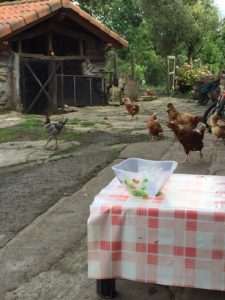
I spent my afternoon writing, sitting out front as the boys played in a hammock. Grandmother scattered corn for the chickens strutting through the yard; the gray-and-white dog snuggled up next to me to nap. The warm sun peaked in and out of clouds that gathered as the day wore on.
After a couple hours, two peregrinos I had met, Pauline and Antoine of Holland, arrived and were offered fruit and rest by our junior hospitaleros, as Marisa had returned only to leave again on another errand. I greeted the couple enthusiastically, and they asked if they could join me at my tiny table.
Antoine and Pauline were gray-haired, somewhere in their sixties, I guessed. They were celebrating 1000 km already, having started their Camino much farther back in Europe. Much farther back in years, too, I thought to myself, looking at their ease and kindness with each other.
Luckily for me, Antoine’s feet were tired. Extolling the glories of my oasis among the chickens, I had them curious, and so I showed them the two rooms. Marisa arrived back home and I made introductions; she excitedly thanked me for bringing in these two friends, who had, upon seeing the accommodations, immediately said “Yes!” and taken off their boots.
As she prepared a special salad for our meal, Marisa and I talked about the struggles of a mother at home with not two but three boys – there was also 3-year-old Gorka. She treated me like family, by turns confiding worries and taking courage, and we planned writing letters to each other to continue our chummy talks. At all praise for our beautiful clean rooms, Marisa shrugged off my words with, “It is just a house. It is only a house.” But what a house. She told me with obvious affection that this farmhouse was passed to her from her mother who lived with them, and from her mother, and back over 300 years. It was timberframe, stone, and plaster, and the feeling of it was simply: home. Textured walls painted warm colors embraced our travelers’ exhaustion in welcome, as deep windows framed the Camino out front, the garden with its apple and pear trees, flowers everywhere, and the far mountains beyond, encouraging us to continue our journey.
In the evening, we all sat at a long wooden table under growling skies that never rained, talking relationships, home, work, politics, purpose, and the value of taking the Camino slowly. Gaizka joined us after dinner for tea, teaching us about Basque history and culture. He explained that the Basque people are proud, strong and independent, fearless risk-takers, famous as sailors, navigators, athletes, and bullfighters. His children learned Basque first, then English and Spanish, at school; Basque was spoken at home. I learned that the tree I visited in Gernika (the Basque version of the city’s name) was the most significant symbol of Basque culture I could have chosen to see. Under this tree, the Basque chieftans and lords had met to make agreements and keep peace through their long history; the tree was the witness to their oaths, binding generations to their words as it continued to live on.
Gaizka’s Basque heritage showed through as he passionately told how Marisa’s mother was a child in 1937 when Franco had Hitler bomb Gernika during the Spanish Civil War – and Grandmother still remembered it. This would make her somewhere around 84 now. Pauline was a child psychologist, Antoine was retired, and I had just quit my long career as a caseworker with homeless people, so we immediately fell into conversation about the human costs of such intense experiences. Just as quickly, we caught ourselves, relieved at being a step removed on the Camino, not working for the moment with all the trauma of the world. And so we bonded over caring, and having chosen work that let us directly care about the suffering of others. We became friends in one night.
We understood, deeply, the need for a safe and loving home. I did not share how deeply I personally understood this, how profoundly unsafe I had felt at home as a child, for far too many years. How I resonated with grandmother’s childhood experience of bombs dropping, of chaos and the hopelessness of wanton destruction. Instead, we celebrated finding this sweetest of family homes, standing solid and strong over the generations, unshaken by the world around it.
At 2am, I woke to use the bathroom. As I tiptoed through the dark past the kitchen, I saw a soft glow, and there stood Marisa, damp curls encircling her face, busy near the warm oven. She had baked us bizcocho, a dense, moist coffee cake, for breakfast in the morning. I hugged her and we laughed in whispers that she would go to bed soon – and sleep in, late, while we all shouldered our packs with the first light.
The moon hung full and bright through wispy blowing clouds high over the Basque mountains as I snuck back to bed. A huge tree grew at the edge of the property, outlined clearly in the night’s soft light. It reminded me of the great tree of Bizkaia, of these people, this family. It endured; they endured. In Norse legends, the creation myths of my own ancestors included the Great Tree of Life, Yggdrasil. It embodied the very universe. What is done to the tree is done to us all. We are all family.
This was my dream for travel in Europe, for the Camino: this gift of warm friendship and loving kindness, of being welcomed into people’s homes and lives as I traveled through. Touched, I realized in how many ways I felt fed and nourished. Safe. To be myself.
I belonged, where I was, in that moment. I was home. I was so overjoyed I could not sleep, and contentedly watched the moon through the window of my bedroom, occasionally wiping a happy tear or two from my eyes. I fell asleep smiling, here in a foreign place I had never seen, but had always been searching for.
November 6, 2017 / wanderinglightning / 0 Comments
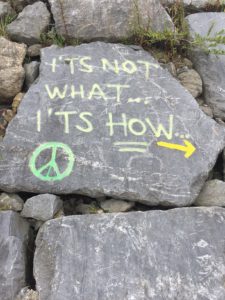
- If there is a seat, sit.
- If you sit, eat.
- If you eat, drink.
- If you can carry more water, carry more water.
- If it’s 3pm – stop walking.

















